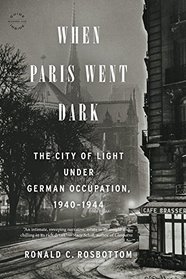Leo T. reviewed When Paris Went Dark: The City of Light Under German Occupation, 1940-1944 on + 1775 more book reviews
The author is a longtime professor at Amherst and has traveled to Paris many, many times. Endnotes are included for readers desiring to chase down the original source, but much of the material Dr. Rosbottom employed is in French.
The author opens with a chronology which allows readers to more easily locate given subjects of their interest, such as Vichy laws against citizens who are not native born, voting to end the Third Republic, Pierre Laval's meeting with surving members of his Council of Minister in Paris on August 17, 1944, or U.S. ambassador Wm. Bullit's service for a few days running Paris with Roger Langeron (prefect of police) between the flight of the government and the arrival of the Germans. 75,700 Jews were deported from France (97% death rate) but Dr. Rosbottom cites recent research that 40,000 had survived in Paris.
Bicycles and the Metro were in heavy use during the Occupation, but stations would be closed without notice. "Citizens found themselves in neighborhoods only a few blocks from their own that they had scarcely known before the war."
This book is very well organized, with chapters including 'subheadings' of a few pages each. The agreement between Vichy and German leaders to divide France is unusual in history and still leads to consternation over collaboration. Dr. Rosbottom chose to examine here "In what ways did Paris in 1940 pass from a city known for its freedoms to a closed, uncanny, unfamiliar place? What effect did the open-endedness of he Occupation, the uncertainty of its duration, have on Parisian daily life? And how did this uncanniness affect both Parisians and their occupiers?"
Photos, maps, bibliography, index.
The author opens with a chronology which allows readers to more easily locate given subjects of their interest, such as Vichy laws against citizens who are not native born, voting to end the Third Republic, Pierre Laval's meeting with surving members of his Council of Minister in Paris on August 17, 1944, or U.S. ambassador Wm. Bullit's service for a few days running Paris with Roger Langeron (prefect of police) between the flight of the government and the arrival of the Germans. 75,700 Jews were deported from France (97% death rate) but Dr. Rosbottom cites recent research that 40,000 had survived in Paris.
Bicycles and the Metro were in heavy use during the Occupation, but stations would be closed without notice. "Citizens found themselves in neighborhoods only a few blocks from their own that they had scarcely known before the war."
This book is very well organized, with chapters including 'subheadings' of a few pages each. The agreement between Vichy and German leaders to divide France is unusual in history and still leads to consternation over collaboration. Dr. Rosbottom chose to examine here "In what ways did Paris in 1940 pass from a city known for its freedoms to a closed, uncanny, unfamiliar place? What effect did the open-endedness of he Occupation, the uncertainty of its duration, have on Parisian daily life? And how did this uncanniness affect both Parisians and their occupiers?"
Photos, maps, bibliography, index.




